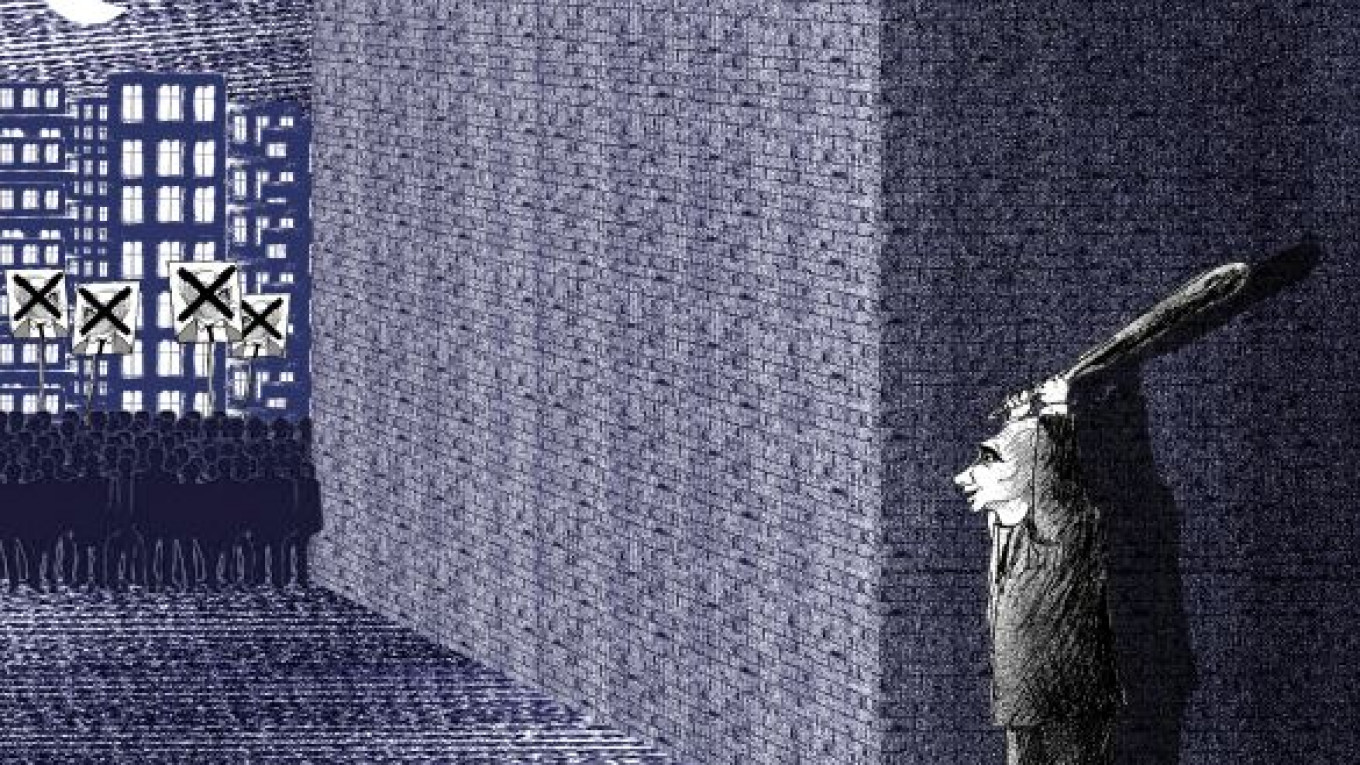Why is President Vladimir Putin resorting to increasingly repressive measures against his opponents? After all, the Putin regime, in place for 13 years, controls most public institutions, the entire security apparatus, including the public prosecutors, and he can close or censor any media outlet without notice. So why target journalists, small entrepreneurs and nongovernmental organizations — an approach that inevitably stifles social and economic life and condemns the country to stagnation? Is the lion scared of the mouse, or is the mouse actually not that small and harmless?
The government's recent record is depressing. In just a few months, the authorities have imposed several new repressive laws, forced influential journalists out of their jobs and prosecuted human rights defenders, mayors, lawyers and prominent politicians. Political leaders, government officials, and judges do not even pretend that the judicial system is independent and fair. Kompromaty — fake, incriminating charges — are used liberally and openly. The closure of USAID's office in Russia is emblematic of efforts to restrict freedom of opinion and limit foreign cooperation.
But the recent clampdown has not deterred the opposition or silenced criticism. The Internet remains vibrant, and street protests continue to be held in major cities. Even opponents like Sergei Udaltsov and Alexei Navalny, against whom the authorities have filed criminal charges, have managed to remain in the game. The opposition's Coordination Council was chosen in an online election in October, with tens of thousands participating in the vote, notwithstanding threats and hacking.
This is the first sign of the institutionalization of organizations and movements outside Putin's orbit and outside captive government institutions like the parliament and state-controlled television. Alternative modes of action remain limited and vulnerable, but they exist and will not disappear. This is already a significant achievement for an authoritarian regime. The Internet cannot be fully controlled, and will thus develop into Russia's main sphere of communication and free speech.
In this new context of institutionalization of anti-establishment groups, the presidential human right council looks even more outmoded and useless after it added 39 new members, bringing the total to 62. At its first meeting with Putin in November, the council's chairman, Mikhail Fedotov, looked uncomfortable and admitted that it will be difficult to work effectively.
To many observers in Russia, however, the regime's post-electoral offensive against "unfriendly" forces seems certain to be counterproductive in the longer term. They may be right.
For starters, the nationwide anti-Putin demonstrations last winter and spring should not be underestimated. The protests mobilized hundreds of thousands of Russians, putting huge pressure on central, regional and local government authorities for several months. They showed that the Kremlin cannot reduce a new and powerful social trend — memorialized by countless web sites, blogs and online archives — to "isolated outbursts" fomented by "foreign agents."
Second, Putin and his cronies know full well that their legitimacy is shaky, given their failure to dispel the widespread perception that the elections in December 2011 and March 2012 were largely rigged. While talk of "modernization" has subsided since Putin regained the presidency in May, corruption has not, and ordinary Russians now hold senior officials responsible for it. For the first time in years, they question their leaders' real intentions and their capacity to deliver better living standards.
Third, a widening generation gap has spread to the ruling elites. Putin's men are seen by their own children, whose horizon is not limited to Russia, as outdated and out of touch. The younger generation feels stifled by their elders' stale, protectionist policies. They did not experience the dull but stable certainties of the Soviet, one-party state, and few yearn for its resurrection.
This is why former President Dmitry Medvedev's "rise and fall," staged like a soap opera, has played a socially corrosive role. While holding Putin's place until he could return for a third presidential term, Medvedev actually rallied public support. As president, he achieved virtually nothing in terms of the rule of law, decentralization, or economic modernization. Nonetheless, a significant part of Russia's elite and middle class pinned their hopes on him as a counterweight to the Putin's clans dominated by security officials. It was wishful thinking, but it permeated the political and social climate.
The spell was broken when Putin reasserted his grip on executive power. His current term will be different from his previous presidential administrations. It will also be more uncertain. Putin and his government lack a forward-looking strategy, an innovative spirit and political agility. While Putin still has considerable resources at his disposal, using them will become increasingly costly — politically, economically and socially.
Authoritarian regimes depend on the silent assent of their populations and the loyalty of their elites. Unfortunately for Putin, when the regime's legitimacy is seriously called into question by so many popular protests, the elites' loyalty can no longer be taken for granted.
Marie Mendras, a research fellow at the Paris-based National Center for Scientific Research and a professor at Sciences Po, is the author of "Russian Politics: The Paradox of a Weak State." © Project Syndicate
A Message from The Moscow Times:
Dear readers,
We are facing unprecedented challenges. Russia's Prosecutor General's Office has designated The Moscow Times as an "undesirable" organization, criminalizing our work and putting our staff at risk of prosecution. This follows our earlier unjust labeling as a "foreign agent."
These actions are direct attempts to silence independent journalism in Russia. The authorities claim our work "discredits the decisions of the Russian leadership." We see things differently: we strive to provide accurate, unbiased reporting on Russia.
We, the journalists of The Moscow Times, refuse to be silenced. But to continue our work, we need your help.
Your support, no matter how small, makes a world of difference. If you can, please support us monthly starting from just $2. It's quick to set up, and every contribution makes a significant impact.
By supporting The Moscow Times, you're defending open, independent journalism in the face of repression. Thank you for standing with us.
Remind me later.







